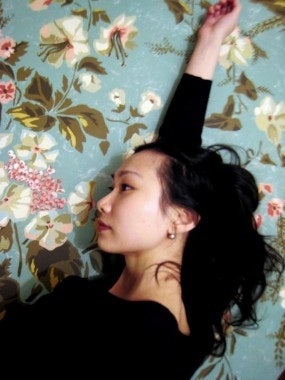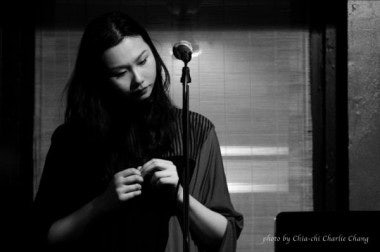Zhang Fuses American Jazz And Traditional Chinese Folk Music#

Having made her name on the thriving Shanghai jazz scene, singer Zhang Le is now making waves around the world with her signature blend of traditional Chinese folk songs and American-style jazz. A graduate of the New England Conservatory of Music, and winner of the Sir Roland Hanna Memorial Award for Jazz Performance in New York City, Zhang now splits her time between New York and Shanghai, performing at events like the Shanghai International Jazz Festival and Bryant Park Fall Festival. Recently, Zhang has been a featured performer on EMI's "Shanghai Jazz: Musical Seductions from China’s Age of Decadence" and a soloist in renowned Chinese composer Tan Dun’s Zen Shaolin. Equally at home as arranger and vocalist, Zhang's smoky voice and unique fusion style -- reminiscent of Shanghai's 1930s jazz age -- is capturing the attention of the American and Chinese public alike.
Recently, Jing Daily spoke with Zhang Le about what attracted her to her chosen musical genre and what we can expect to hear from her next.
Jing Daily (JD): You started singing as a teenager. Were you always passionate about jazz?#
Zhang Le (ZL)#
: I was a studio musician before I started to sing jazz. Before that, I was in one of the best local children's choirs for seven years, singing only classical music. However, I was really into pop music when I was younger. In 2000, I was offered a singing gig at the Hilton Shanghai, and the hotel wanted to hear jazz standards, so that's why I came to learn jazz.
JD: Tell us a little about your album ["When Will the Moon Be Clear and Bright"].#
ZL#
: This album is the one that reflects who I am as a musician and singer. Most the songs are original music with Chinese lyrics, and the idea came from old poems, Buddhist Sutras, and personal experience. Some of my favorite pieces [derive] from 1930s Shanghai movie songs. I rearranged all of the music, and gave them a different flavor. I am deeply influenced by jazz, and I am also familiar with Chinese folk melodies as well as the language, so the combination of the two turned out to be something personal, or so-called Chinese-American fusion jazz.
JD: Apart from fusing elements from Chinese folk music and opera in your album, the album includes two Buddhism-influenced songs. What were you trying to convey with this?#
ZL#
: Buddhism is more of a philosophy than a religion to me. These two songs were composed by bassist Russ Flynn, and they are powerful and emotional. By the time [I recorded them], I was reading the Heart Sutra, and was going through a difficult period, and I was trying to find peace with myself. So I put some lines from the Sutra to Russ's music, and it worked. These songs reflect a specific moment in my life, when I wanted to share my feelings with others.
JD: There are a lot of Chinese elements in your music. Have you encountered any difficulties in communicating about your music with other musicians in the United States?#
ZL#
: No, all the musicians I work with are very professional, and as I said, I am deeply influenced by jazz, so we're all speaking the same language musically. They love pentatonic melodies, and have been really impressed by the melodic variation. Still, it's been lot of fun to explain the meaning of the lyrics to [American] musicians, because sometimes they can't understand the "Chinese way of thinking," and that's just a cultural difference.
JD: Do you find it difficult for American audiences to understand your particular style of jazz?#
ZL#
: No. On the contrary, I think the American audiences are very open-minded, and they're interested in learning about other cultures, especially the fusion of Chinese [folk] music and jazz. I am enjoying sharing my music with them.
JD: How do the jazz scenes differ between New York and Shanghai?#
ZL#
: New York is very competitive, and it can be very difficult to make a living as an independent artist. I am very lucky, because right now China is a hot-spot, and many people are interested in our culture. So it really brings in a lot of opportunities. Shanghai has a great jazz scene right now. I was there for the International Jazz Festival in October, and it was a wonderful experience. Although it has a smaller audience base compared to pop music, Shanghai is the best city for jazz in China.

JD: How would you characterize the changes you've seen in the Chinese jazz scene since your days at the Peace Hotel's Jazz Bar in Shanghai in 1996? What do you think is the future of jazz in China?#
ZL#
: Shanghai was called the "Paris of the East" in the 1930s, and if you listen to the old songs from that era, you can understand the popularity of jazz in China. I was singing at the Hilton Shanghai back in 2000, and before I left for Boston in 2004, Shanghai had already become quite well known for its jazz scene in Asia. However, things are getting even better now. We have the Shanghai International Jazz Festival every year, and that attracts so many great musicians from all over the world.
Compared to a couple of years ago, we have a much big younger audience, and they're interested in hearing something new. I think jazz will catch on among more and more Chinese people, but since it is not mainstream music, its influence will be limited.
JD: Having studied at the NEC (New England Conservatory of Music) and Queens College, you've worked with great American jazz artists like Antonio Hart and John McNeil. Who inspired you the most?
ZL#
: There are too many great musicians to name. But I have to say I am most inspired by two of my vocal teachers, Dominique Eade and Theo Bleckmann, and the great pianist Ran Blake.
JD: What are you working on now?#
ZL#
: Right now I'm working on a project with Dave Liang of the Shanghai Restoration Project, and I plan to work on my own second album this year as well.
For audio and video clips, be sure to check out Zhang Le's website. Next up, Zhang Le will perform with Dave Liang on March 3 at the China Institute in New York at the "Little Dragon Tales" Family Workshop and with the Shanghai Restoration Project at the Asia Society on March 9.#
